Dems assure public on USAID: ‘It’s not corruption; It’s *democratic* corruption’

Washington, D.C.—As the DOGE audit unearths what many describe as egregious misuse of funds within USAID, Democrats have taken to the podium with a twist that’s both novel and, if you squint hard enough, almost convincing. “Corruption? No, no, no,” chuckled Senator Talksalot at a recent press conference, “what you’re witnessing is the beauty of democratic corruption. It’s corruption for the people, by the people, and of the people.”
According to this new doctrine, any financial discrepancies, misallocations, or outright theft within USAID aren’t signs of corruption but rather a testament to the democratic process. “Think of it as a grassroots initiative,” explained Representative Neverdo. “We’re redistributing wealth in a way that’s messy, sure, but it’s all in the name of democracy. If the people we elect can’t enjoy a little discretionary spending, what’s the point of democracy?”
The term “democratic corruption” has been met with a mix of laughter and bewilderment. Political analysts have had a field day, with one noting, “It’s like calling a hurricane ‘democratic weather’ because everyone gets a little wet.”
Critics argue that this redefinition is merely an attempt to sanitize what’s clearly unethical behavior. “Last I checked, democracy didn’t include using taxpayer money to fund lavish parties in Bali or buy yachts for NGOs,” retorted a conservative pundit, clearly not buying into the new narrative.
Supporters of the “democratic corruption” model, however, are pushing back with creative vigor. “Isn’t it democratic for funds to find their way to where the votes are?” queried a Democratic strategist, barely keeping a straight face. “If we’re going to have corruption, let’s at least make it participatory.”
In response, the DOGE audit, led by the now-celebrity hacker Big Balls, has promised to delve deeper into these democratic practices. “We’ll see just how democratic this corruption really is,” Big Balls stated in a leaked memo, hinting at potential legal actions that might follow.
Meanwhile, the public is left scratching their heads, wondering if this is a new low in political spin or the dawn of a new era where corruption is just another word for political freedom. Either way, the phrase “democratic corruption” has entered the political lexicon, providing endless material for late-night shows and political cartoons.
As this saga unfolds, one can only hope that the term “democratic corruption” doesn’t become the next big thing in political science textbooks. After all, if corruption is now democratic, what’s next? “Democratic tax evasion”? Only time will tell, but for now, the political theater in Washington has never been so entertaining.
![]()




